Warrior Nation: War, militarisation and British democracy
June 2018
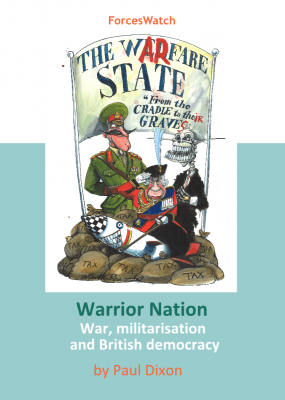 This report explores how the 'Militarisation Offensive' which started in 2006 to improve public recognition and support for the armed forces failed to produce majority support for the war in Afghanistan but deepened the militarisation of British politics and society. Since 2006 the military have broken constitutional convention and made public attacks on politicians, leading to the most severe tensions in political-military relations since the Second World War.
This report explores how the 'Militarisation Offensive' which started in 2006 to improve public recognition and support for the armed forces failed to produce majority support for the war in Afghanistan but deepened the militarisation of British politics and society. Since 2006 the military have broken constitutional convention and made public attacks on politicians, leading to the most severe tensions in political-military relations since the Second World War. The armed forces and special schools
Concerns we have raised with the Scottish Parliament about armed forces activities in special schools have been picked up by The Daily Record newspaper.
The new tide of militarisation
updated 2018
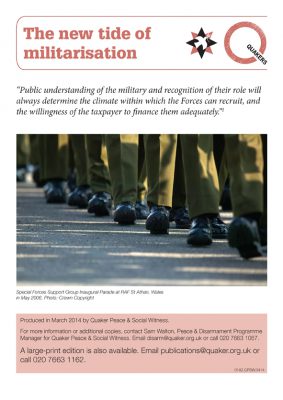 Militarism has existed in the Britain for a long time, but there is a new tide of militarisation that has developed over the last five years. This briefing from Quaker Peace and Social Witness, explores the government strategy to increase public support for the military, in order to raise the willingness of the public to pay for the military, make recruitment easier, and stifle opposition to unpopular wars.
Militarism has existed in the Britain for a long time, but there is a new tide of militarisation that has developed over the last five years. This briefing from Quaker Peace and Social Witness, explores the government strategy to increase public support for the military, in order to raise the willingness of the public to pay for the military, make recruitment easier, and stifle opposition to unpopular wars.
Submission to the Human Rights and the Scottish Parliament inquiry
April 2018
 This submission made by ForcesWatch and Quakers in Scotland to the Scottish Parliament's human rights inquiry details our concerns around the need for regulation and transparent accountability of military activities in schools, the lack of education about peace and human rights, and the continued recruitment of children into the UK armed forces.
This submission made by ForcesWatch and Quakers in Scotland to the Scottish Parliament's human rights inquiry details our concerns around the need for regulation and transparent accountability of military activities in schools, the lack of education about peace and human rights, and the continued recruitment of children into the UK armed forces.
Evidence submitted to the Armed Forces and Veterans Mental Health Inquiry
March 2018
Written evidence submitted by ForcesWatch to the Defence Committee's Armed Forces and Veterans Mental Health Inquiry.
Taking action on militarism films
November 2017
Rethinking security
November 2017
Take Action on Militarism: website and resource pack
October 2017
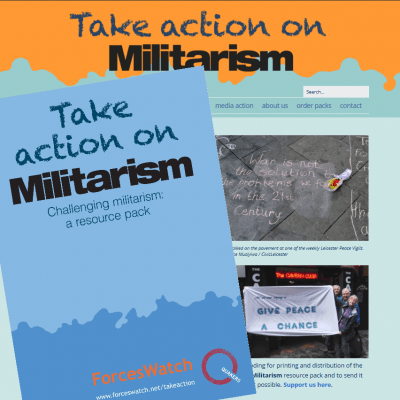 ForcesWatch have teamed up with Quaker Peace & Social Witness to produce a resource pack to help people take action on militarism in their communities. And there is a website to go with it where you can download the pack or order a hard copy, find links to more resources etc.
ForcesWatch have teamed up with Quaker Peace & Social Witness to produce a resource pack to help people take action on militarism in their communities. And there is a website to go with it where you can download the pack or order a hard copy, find links to more resources etc.
Armed forces visits to schools in Scotland: An update for 2016-2017
November 2017
This ForcesWatch briefing analyses data on armed forces visits to schools in Scotland for 2016-17.
Why a white poppy?
October 2017
The First Ambush: Effects of army training and employment
June 2017
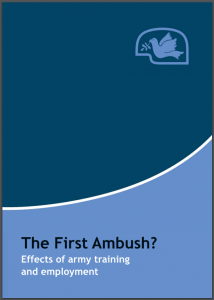 This report from Veterans For Peace UK details how the Army's training process has a forceful impact on attitudes, health, and behaviour even before recruits are sent to war. The findings show that military training and culture combine with pre-existing issues (such as a childhood history of anti-social behaviour) to increase the risk of violence and alcohol misuse. Traumatic war experiences further exacerbate the problem.
This report from Veterans For Peace UK details how the Army's training process has a forceful impact on attitudes, health, and behaviour even before recruits are sent to war. The findings show that military training and culture combine with pre-existing issues (such as a childhood history of anti-social behaviour) to increase the risk of violence and alcohol misuse. Traumatic war experiences further exacerbate the problem.
Soldiers at 16 – The other side of the story
January 2017
Should the military be promoted in schools?
updated 2017
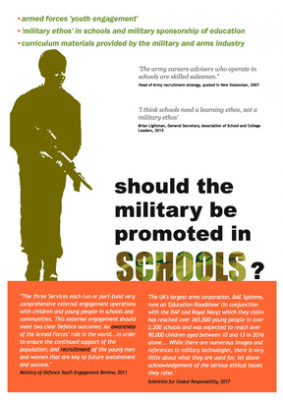 The armed forces have a growing involvement in secondary schools, colleges and even primary schools. While the Army, Navy and RAF have long run activities in schools as part of the Ministry of Defence's Youth Engagement programme, the Department for Education promotes 'military ethos' within education, and parts of the armed forces, along with the arms industry, are developing their involvement with curriculum provision and sponsorship of education institutions. This A4 leaflet (updated 2017) outlines the issue and what the concerns are.
This A4 leaflet (updated 2017) outlines the issue and what the concerns are.
The armed forces have a growing involvement in secondary schools, colleges and even primary schools. While the Army, Navy and RAF have long run activities in schools as part of the Ministry of Defence's Youth Engagement programme, the Department for Education promotes 'military ethos' within education, and parts of the armed forces, along with the arms industry, are developing their involvement with curriculum provision and sponsorship of education institutions. This A4 leaflet (updated 2017) outlines the issue and what the concerns are.
This A4 leaflet (updated 2017) outlines the issue and what the concerns are.
Does the military give young people a ‘leg up’? The armed forces and social mobility
May 2017
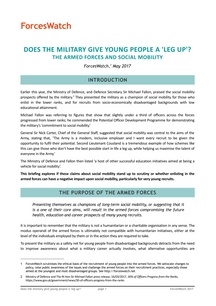
This briefing explores if these claims about social mobility stand up to scrutiny or whether enlisting in the armed forces can have a negative impact upon social mobility, particularly for very young recruits.
Answering difficult questions about militarism
February 2017
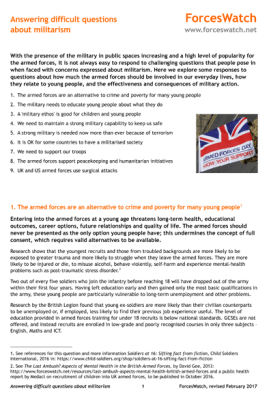 With the presence of the military in public spaces increasing and a high level of popularity for the armed forces, it is not always easy to respond to challenging questions that people pose in when faced with concerns expressed about militarism. In this briefing we explore some responses to questions about how much the armed forces should be involved in our everyday lives, how they relate to young people, and the effectiveness and consequences of military action.
With the presence of the military in public spaces increasing and a high level of popularity for the armed forces, it is not always easy to respond to challenging questions that people pose in when faced with concerns expressed about militarism. In this briefing we explore some responses to questions about how much the armed forces should be involved in our everyday lives, how they relate to young people, and the effectiveness and consequences of military action.
